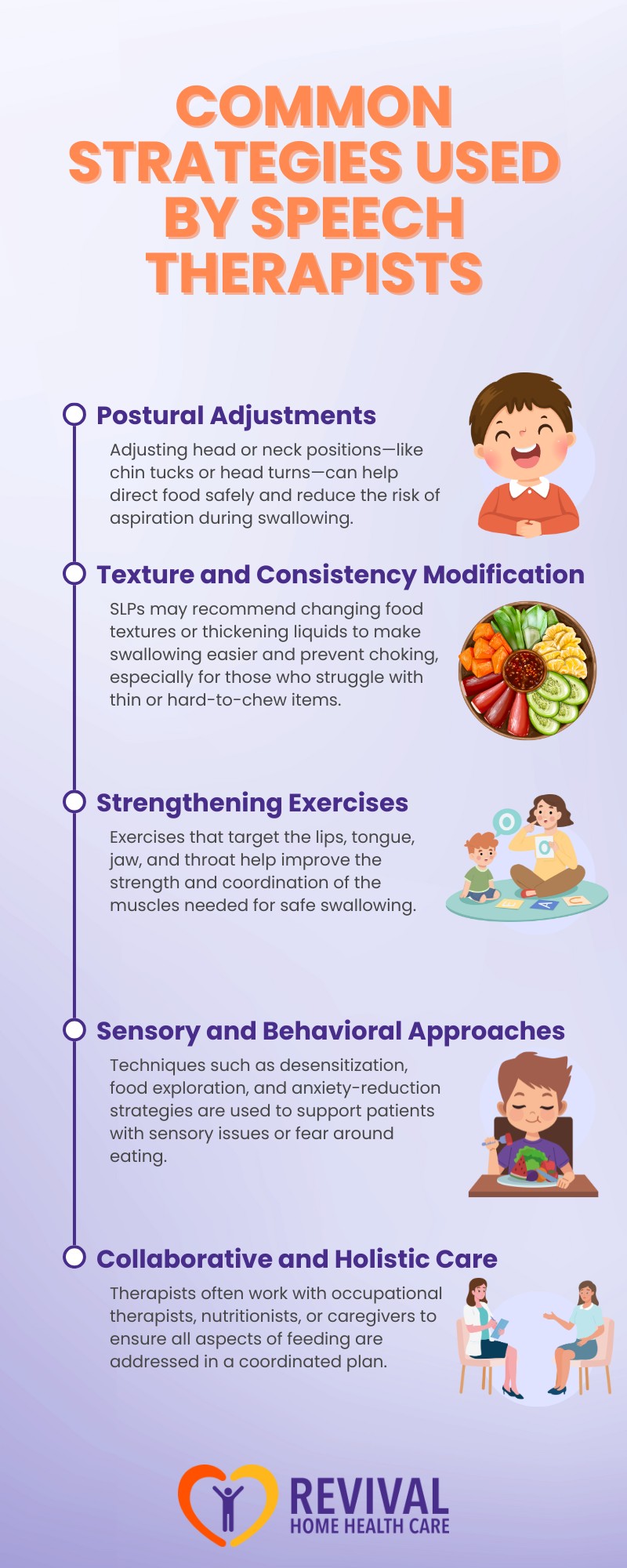Key Points:
- Speech therapists play a critical role in evaluating and managing feeding and swallowing disorders.
- They use evidence-based techniques to ensure safe mealtimes, reduce aspiration risks, and promote adequate nutrition.
- Families can benefit from in-home therapy that offers personalized care in a comfortable environment.
Feeding your loved one should feel comforting—not stressful. But when chewing, swallowing, or eating turns into a daily concern, the worry can take over mealtime. Many families silently wonder: Is my child or parent safe when eating? What if something goes wrong? This is where speech therapists—and the right professional help—come in, not just for words, but for swallowing, too.
Understanding the Link Between Speech Therapy and Swallowing
While many associate speech therapy solely with communication, speech-language pathologists (SLPs) are also trained experts in feeding and swallowing. This specialization is called dysphagia therapy. SLPs are often key members of a care team for individuals who struggle with eating safely, whether due to neurological conditions, developmental delays, injury, or aging.
They assess how the muscles of the mouth and throat work together—and when they don’t, they create a plan to help. Whether it’s a toddler refusing solid foods or a senior recovering from a stroke, speech therapists guide families through the journey of safer and more effective feeding.

The Scope of Feeding and Swallowing Disorders
Feeding and swallowing issues can look different depending on age and health condition.
Infants and Children
Feeding disorders in children might present as:
- Coughing or choking while eating
- Difficulty transitioning to solid foods
- Poor weight gain
- Long mealtimes or food refusal
SLPs help identify whether these signs stem from physical, sensory, or behavioral challenges. Early intervention is key, and therapy often includes exercises to strengthen oral muscles, modify food textures, or introduce feeding routines.
Adults and Seniors
Adults may develop swallowing problems due to stroke, Parkinson’s disease, dementia, or surgery. Symptoms might include:
- A sensation of food being stuck
- Coughing during meals
- Unexplained weight loss
- Pneumonia due to aspiration
In these cases, speech therapists conduct swallowing assessments, often using tools like a clinical bedside evaluation or instrumental assessments such as a Modified Barium Swallow Study. From there, they build personalized strategies to support safe swallowing.
How Speech Therapists Ensure Feeding and Swallowing Safety
Speech therapists approach feeding safety in a methodical and compassionate way. Their interventions are customized to each person’s abilities and needs.
Step 1: Comprehensive Swallowing Assessment
An SLP begins by evaluating how the oral and pharyngeal muscles function. This includes observing chewing, lip closure, tongue movement, and the ability to swallow various textures. In some cases, an instrumental evaluation (like a video swallow study) may be needed to get a clear picture of how food travels through the mouth and throat.
These assessments help uncover the root of the difficulty—whether it’s muscle weakness, poor coordination, delayed reflexes, or structural issues.
Step 2: Developing a Treatment Plan
Based on the findings, the therapist creates an individualized care plan, which may include:
- Oral-motor exercises to strengthen muscles
- Safe swallowing techniques, like chin tuck or head turn maneuvers
- Diet modifications, such as pureed foods or thickened liquids
- Pacing strategies to slow down intake
- Positioning techniques during meals
The goal is always safety first—preventing choking and aspiration—followed by efficiency and comfort while eating.
Step 3: Educating and Empowering Caregivers
A vital part of feeding therapy is teaching family members and caregivers how to support safe meals at home. This includes demonstrations, written instructions, and plenty of encouragement. Speech therapists help caregivers feel confident in preparing appropriate meals, monitoring swallowing safety, and recognizing red flags.
It’s about creating a supportive feeding environment that meets medical needs while preserving the dignity and enjoyment of eating.
Common Strategies Used by Speech Therapists
Speech-language pathologists (SLPs) use a variety of personalized techniques to support safe and effective feeding and swallowing. Here are some of the most common approaches:

Who Needs Feeding and Swallowing Support from a Speech Therapist?
Speech therapy for feeding and swallowing isn’t just for those with major health issues. It can help anyone struggling with:
- Chewing difficulties
- Frequent coughing or throat clearing during meals
- Avoidance of certain foods or textures
- Prolonged mealtimes
- Sudden weight loss or dehydration
SLPs support people across the lifespan—from premature infants with weak suckling reflexes to older adults facing age-related swallowing decline. The earlier the signs are addressed, the better the outcomes.
Benefits of In-Home Speech Therapy for Swallowing Disorders
Receiving feeding therapy in the comfort of home has several advantages:
- Familiar environments help patients feel relaxed
- Meals and routines are more realistic and easier to observe
- Family involvement is greater, improving consistency
- Travel is avoided, which is especially helpful for medically fragile individuals
An in-home approach makes it easier to apply therapy techniques in everyday settings, like a patient’s kitchen or dining room, which often leads to better carryover and success.
When to Seek Help
If you notice signs like repeated choking, unexplained weight loss, or food avoidance, it’s time to consult a professional. Feeding and swallowing disorders don’t resolve on their own—and waiting can lead to complications like aspiration pneumonia, malnutrition, or social withdrawal.
Your primary care physician or specialist can refer you to a licensed speech-language pathologist for an evaluation. If mobility or travel is a concern, look into services that provide therapy in the home for added convenience and comfort.
Connect with Revival Home Health Care for In-Home Speech Therapy in New York
If you or a loved one is struggling with feeding or swallowing challenges, know that help is available—and it can come right to your doorstep. Revival Home Health Care offers compassionate, expert in-home speech therapy in New York, helping individuals safely navigate mealtimes in the comfort and security of their homes.
Our licensed speech-language pathologists are trained to assess, treat, and support clients with dysphagia, ensuring care plans that fit your daily life. Whether it’s a child with feeding delays or an adult recovering from a stroke, Revival’s team is here to help you eat safely, with confidence.
Contact us today to schedule a consultation and begin the journey toward safer, more comfortable mealtimes at home.


 75 Vanderbilt Ave Staten Island, NY 10304
75 Vanderbilt Ave Staten Island, NY 10304 info@revivalhhc.org
info@revivalhhc.org 718.629.1000
718.629.1000